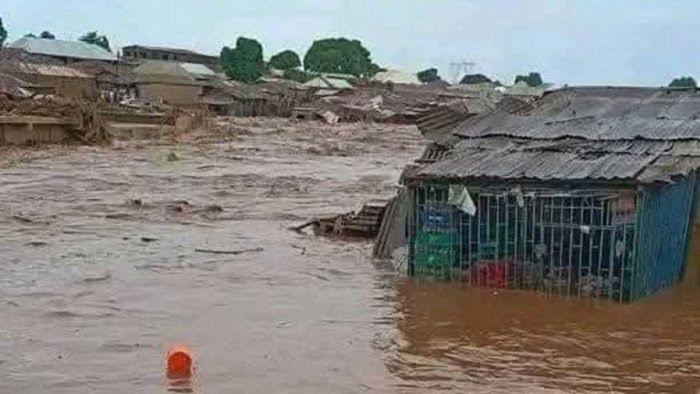In what is now being described as one of the deadliest flood disasters in recent Nigerian history, over 200 people have been confirmed dead and more than 500 are still missing after severe flooding ravaged Mokwa Local Government Area of Niger State. The flood, which struck on May 28, 2025, followed several hours of torrential rain, further intensified by the collapse of a dam in the region. The deluge completely submerged communities, washed away homes and destroyed critical infrastructure.
How It All Began: Torrential Rainfall and a Failed Dam
The disaster began in the early hours of May 28, when unrelenting rains battered Mokwa and surrounding areas. According to eyewitness accounts, the downpour lasted for nearly eight hours without pause.
The tipping point came when a nearby dam reportedly burst, releasing a massive volume of water that overwhelmed the Mokwa River and surrounding lowlands.
Within minutes, rising floodwaters swept through communities like Kudu, Muwo, Jebba, and Takuma, leaving residents scrambling for safety. Entire buildings were submerged, with many families caught unaware in their sleep or early morning routines.
Death Toll and Missing Persons
As of the latest update, 200 people have been confirmed dead, while over 500 remain unaccounted for. Local rescue teams, community volunteers, and emergency agencies are still combing through debris and waterlogged areas in search of survivors or victims. The real figures could be higher as several rural communities remain cut off.
Among the heart-wrenching stories is that of Adamu Yusuf, a 36-year-old farmer who lost his wife and newborn baby, along with seven other family members.
“I watched helplessly as the water swept them away,” Yusuf recounted in tears. “I tried to save them, but the current was too strong.”
Humanitarian Crisis: Injuries, Displacement, and Trauma
Beyond the death toll, the human suffering is immense. According to the National Emergency Management Agency (NEMA), at least 121 individuals sustained injuries, many of them critical.
More than 3,000 residents have been rendered homeless, now taking refuge in temporary camps set up in schools, mosques, and churches.
Displaced families are battling shortages of food, clean water, and medical supplies. There are growing fears of waterborne diseases, including cholera and typhoid, especially in overcrowded shelters with limited sanitation facilities.
Infrastructure in Ruins
The flood did not spare the area’s infrastructure. Reports confirm the collapse of three major bridges, severing road access between Mokwa and neighboring towns. Two major roads were completely washed away, complicating rescue and relief efforts.
Farmers in the region are also counting their losses. Over 10,000 hectares of paddy rice farms have been destroyed in Mokwa alone, affecting more than 5,000 dry-season farmers across Niger and Kwara States. Experts estimate billions of naira in economic losses.
Government Response and Community Aid
President Bola Ahmed Tinubu has expressed deep sorrow over the tragedy and ordered immediate intervention. In a statement from the Presidency, the President directed NEMA to coordinate emergency relief efforts, including food distribution, medical aid, and rescue logistics.
Niger State Governor Umar Bago also visited the affected areas and pledged state-level support for rebuilding efforts. Senator Sani Musa donated ₦50 million and several truckloads of relief materials to the victims.
Meanwhile, local NGOs and faith-based organizations are mobilizing donations and volunteers. Youth groups have also stepped in, assisting with body recovery, food distribution, and shelter coordination.
A Bigger Problem: Climate Change and Regional Flooding
Experts have pointed to climate change as a major contributing factor. This flood is part of a broader pattern of increased rainfall intensity, dam failures, and inadequate drainage systems across West Africa.
In neighboring Republic of Niger, similar floods have killed over 270 people and displaced more than 700,000 individuals.
Environmental analysts warn that without urgent action on flood management and climate adaptation, such tragedies will become more frequent.
Join our Whatsapp channel to stay updated always!
Click here to join our Whatsapp channel




